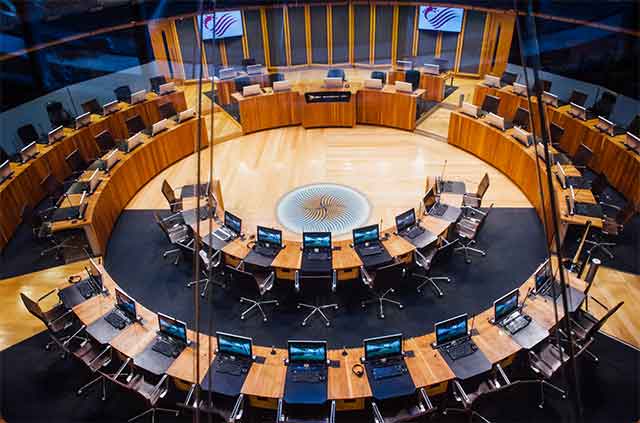The Senedd backed calls to keep free entry to museums amid concerns that Welsh Government budget cuts risk endangering Wales’ national collections.
Heledd Fychan warned a maintenance backlog of tens of millions of pounds has deteriorated to such an extent that the National Museum Cardiff is fearful it could be forced to close.
The Plaid Cymru MS told the chamber that failing a mechanical, electrical and plumbing inspection would mean closing the museum, partly or fully, for an undefined time.
She said: “We’ve been shown photos of priceless collections next to buckets overflowing with water. We’ve been warned about outdated electrics and inadequate storerooms.”
Ms Fychan drew parallels with Brazil, saying 92% of the country’s collections were lost in an avoidable fire after curators’ warnings were ignored and the museum was underfunded.
‘Job losses’
The South Wales Central MS criticised job losses during the debate on a cross-party motion, co-submitted by Tom Giffard and Jane Dodds for the Tories and Lib Dems respectively.
She said culture institutions are all going through redundancy programmes, meaning vital skills are already being lost, with no time to put succession plans in place.
“And worst of all, the Welsh Government is helping to fund these redundancies,” she said.
Ms Fychan expressed alarm about suggestions free entry to national museums could end, saying the policy has been a success since it was introduced under Rhodri Morgan in 2001.
Raising concerns about the long-term impact of cuts, she pointed to an article by Andrew Green, a former chief librarian, entitled ‘Why is the Welsh Government at war with culture?’.
‘Political will’
Mr Green wrote that people should be “deeply worried by a government whose members can’t manage to grasp the critical importance of maintaining and improving state support”.
Plaid Cymru’s shadow culture minister also quoted Pedr ap Llwyd, who retired as the National Library’s chief executive on Friday, as warning of a “gap in the political will”.
She said: “Our culture and our heritage matter. They aren’t something nice to have when times are good; they are a vital part of our nation.”
Tom Giffard, the Conservatives’ shadow minister, raised concerns about “disproportionate” budget cuts, questioning why the arts and culture sector has borne the brunt.
Mr Giffard accused Welsh ministers of “hiding” behind the arm’s-length body principle to avoid responsibility for decisions instead made around the cabinet table.
‘Existential crisis’
Sioned Williams, the Plaid Cymru MS for South Wales West, said Amgueddfa Cymru and the National Library of Wales are facing an existential crisis.
She said: “The warning is clear. If we don’t support the calls in the motion before us, the price for the future of our nation will be one that we cannot afford to pay.”
Mike Hedges, a Labour backbencher, who represents Swansea East, said it is important that cuts do not endanger the collections due to unsuitable spaces or a lack of specialist staff.
But he told MSs: “We also need to realise we cannot keep on spending more money … let’s find places to save and let’s prioritise things – if everything’s a priority, nothing is.”
Delyth Jewell, who chairs the Senedd’s culture committee, said Amgueddfa Cymru staff often come in at night to move art from the walls and place buckets to catch rainwater.
‘Independent review’
Dawn Bowden, the deputy minister for arts, recognised the challenges Amgueddfa Cymru and the National Library of Wales face in maintaining ageing buildings.
She said Amgueddfa Cymru has received £5m and the National Library £2m, which is being kept in the next financial year to address the most pressing maintenance concerns.
Ms Bowden told the Senedd she commissioned an independent review of the collections’ management last year and it is due to report this month.
Criticising Prof Llwyd’s “somewhat disingenuous” comments about a lack of political will, Ms Bowden said he had ample opportunity to put his concerns to her but did not.
She stressed that she does not want Amgueddfa Cymru to charge for entry but, in a crisis, every avenue of income generation at its disposal must be explored.
The motion was agreed 27-16 following the debate on March 20, with seven MSs abstaining and some support from the Labour backbenches.

